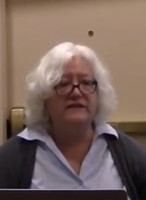Rosemary Joyce facts for kids
Quick facts for kids
Rosemary A. Joyce
|
|
|---|---|
 |
|
| Born |
Rosemary Alexandria Joyce
April 7, 1956 |
| Nationality | American |
| Scientific career | |
| Institutions | University of California, Berkeley |
Rosemary A. Joyce (born 1956) is an American anthropologist and archaeologist. She studies ancient cultures, especially in Honduras. Dr. Joyce is known for her work on how people lived in the past. She also helped confirm that chocolate was first used to make a fermented drink, like beer. She also studies how ideas about gender were part of ancient societies.
Contents
Biography
Rosemary A. Joyce was born in 1956. She is a Professor of Anthropology at UC Berkeley. This means she teaches and researches about human societies and cultures.
Research
Dr. Joyce has been doing archaeological research in Honduras since 1977. She looks at ancient homes, pottery, and how people's roles in society were understood. This includes how gender was seen in ancient Mesoamerican societies. Mesoamerica includes parts of Central America and Mexico.
Understanding Ancient Societies
Archaeologists study old objects and images to learn about the past. Dr. Joyce's work shows that women held important positions in ancient societies. This was true even if men were shown more often in art. She has also suggested that ancient art shows a wider range of gender expressions. This means people might have understood gender differently than we do today.
Comparing Ancient Cultures
Dr. Joyce worked with Lynn Meskell, who studies Ancient Egypt. They compared the Maya civilization with the New Kingdom of Egypt. Both societies existed long before modern ideas about the mind and body being separate. In both cultures, most of the archaeological finds are from powerful men.
They found that Egyptian art often showed strong, perfect male bodies. Mayan art also showed male figures, but often in different ways. Mayan women in art were usually covered, unless they were caring for a baby. Egyptian women, however, were sometimes shown in ways that suggested adulthood, even when young. These studies help us understand how ancient people viewed roles in society. They also show how objects were used in different ways. Spiritual beliefs in pre-conquest Mesoamerica also show different ideas about gender. For example, some gods, like the Mayan corn or moon gods, had both male and female traits.
The Discovery of Chocolate's Origins
Another important part of Dr. Joyce's work was a study with John Henderson. He is an anthropologist from Cornell University. They found traces of cacao on old pottery pieces from Honduras. They discovered that cacao was first used to make a fermented drink, like beer. People would ferment the pod and throw away the seeds. Later, ancient people started using the seeds to make a bitter, non-alcoholic chocolate drink.
To be sure of their findings, Dr. Joyce and Dr. Henderson asked other experts for help. They contacted Patrick McGovern, an archaeometrist, and Jeffrey Hurst, a chocolate chemist for Hershey Chocolate. These experts confirmed the presence of theobromine. This chemical is found in cacao and is rare in other plants. This research showed a connection between the Honduran site and Mayan cacao fields. These fields were thousands of kilometers away, showing ancient trade.
Dr. Joyce's studies in Honduras also showed something interesting. The civilizations there did not have the same level of social inequality as the Maya world. Power was not held by just a few people. Evidence suggests that smaller cities were linked together. In these cities, "women were as likely as men to have held positions of power."
Honors
- 2022 Alfred Vincent Kidder Award from the American Anthropological Association
- Honorary doctorate, Leiden University in 2022
Selected publications
- Joyce, RA 2020, The future of nuclear waste: what art and archaeology can tell us about securing the world's most hazardous material, Oxford University Press.
- Joyce, RA and SD Gillespie (eds.) 2015, Things in Motion: Object Itineraries in Anthropological Practice, School for Advanced Research.
- Hendon, JA, Joyce, RA and J Lopiparo 2014, Material Relations: The Marriage Figurines of Prehispanic Honduras, University Press of Colorado.
- Joyce, RA 2008, Ancient Bodies, Ancient Lives: ..., Gender, and Archaeology, Thames and Hudson.
- Joyce, RA and LM Meskell 2003, Embodied Lives: Figuring Ancient Maya and Egyptian Experience, Routledge.
- Hendon, JA and RA Joyce (eds.) 2003, Mesoamerican Archaeology: Theory and Practice, Wiley-Blackwell.
- Joyce, RA 2002, The Languages of Archaeology: Dialogue, Narrative, and Writing, Wiley-Blackwell.
- Joyce, RA 2001, Gender and Power in Prehispanic Mesoamerica, University of Texas Press.
- Joyce, RA and SD Gillespie (eds.) 2000, Beyond Kinship: Social and Material Reproduction in House Societies, University of Pennsylvania Press.
 | Kyle Baker |
 | Joseph Yoakum |
 | Laura Wheeler Waring |
 | Henry Ossawa Tanner |

